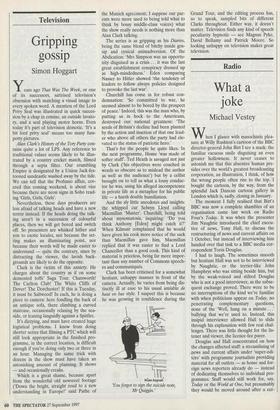Television
Gripping gossip
Simon Hoggart
Years ago That Was The Week, or one of its successors, satirised television's obsession with matching a visual image to every spoken word. A mention of the Lord Privy Seal was illustrated in quick succes- sion by a chap in ermine, an outside lavato- ry, and a seal playing motor horns. Even today it's part of television demotic. 'It's a bit lord privy seal' means too many fuss- potty pictures.
Alan Clark's History of the Tory Party con- tains quite a lot of LPS. Any reference to traditional values seems likely to be illus- trated by a country cricket match, filmed through a sepia filter. Our crumbling Empire is designated by a Union Jack-fes- tooned sandcastle washed away by the tide. We can tell that the Profumo affair, cov- ered this coming weekend, is about vice because there are neon signs in Soho read- ing 'Girls, Girls, Girls'.
Nevertheless, these days producers are less afraid of talking heads and have a new terror instead. If the heads doing the talk- ing aren't in a succession of colourful places, then we will get bored and switch off. So presenters are whisked hither and yon to exotic locales, not because the set- ting makes an illuminating point, nor because their words will be made easier to understand — quite the contrary, since by distracting the viewer, the lavish back- grounds are likely to do the opposite.
Clark is the victim of this anxiety. He charges about the country as if on some demented toffs' Saga Tour. Chatsworth! The Carlton Club! The White Cliffs of Dover! The Dorchester! If this is Tuesday, it must be Saltwood! In each, he is doing a piece to camera: here fondling the back of an antique sofa, there climbing a curved staircase, occasionally relaxing by the sea- side, or leaning languidly against a Spitfire.
It's dizzying, and must have created huge logistical problems. I know from doing shorter series that filming a PTC which will still look appropriate in the finished pro- gramme, in the correct location, is difficult enough if you're doing only two or three in an hour. Managing the same trick with dozens in the show must have taken an astonishing amount of planning. It shows — and occasionally creaks.
Which is a great shame, because apart from the wonderful old newsreel footage (Down the bright, straight road to a new understanding in Europe!' said Pathe of the Munich agreement; I suppose our par- ents were more used to being told what to think by bossy middle-class voices) what the show really needs is nothing more than Alan Clark talking.
The series is as gripping as his Diaries, being the same blend of bitchy inside gos- sip and cynical animadversion. Of the Abdication: 'Mrs Simpson was an opportu- nity disguised as a crisis ... it was the last great establishment conspiracy dressed up as high-mindedness.' Eden comparing Nasser to Hitler showed 'the tendency of leaders to follow always policies designed to provoke the last war'.
Churchill has come in for robust con- demnation: `So committed to war, he seemed almost to be bored by the prospect of peace.' Indeed, this was the man who, by putting us in hock to the Americans, destroyed our national greatness: 'The seeds of Britain's decline had been planted by the action and inaction of that one lead- er who above all others the party had ele- vated to the status of patriotic hero.'
That's for the people he quite likes. In the next programme, Home 'was made of softer stuff. Ted Heath is savaged not just by Clark (`his objectives were couched in words so obscure as to mislead the author as well as the audience') but by a cellist brought on to tell us what a lousy conduc- tor he was, using his alleged incompetence in private life as a metaphor for his public life — a harsh double humiliation.
And the sly little anecdotes and insights: the whipped cur Selwyn Lloyd calling Macmillan 'Master'. Churchill, being told about myxomatosis, inquiring: `Do you think Anthony [Eden] might catch it?' When Kilmuir complained that he would have given his cook more notice of the sack than Macmillan gave him, Macmillan replied that it was easier to find a Lord Chancellor than a good cook. This kind of material is priceless, being far more impor- tant than any number of Commons speech- es and communiquds.
Clark has been criticised for a somewhat hesitant, unhappy manner in front of the camera. Actually, he varies from being dis- tinctly ill at ease to his usual amiable de haut en bas style. I suspect this is because he was growing in confidence during the You forgot to sign the suicide note, Mr Quiggin.' Grand Tour, and the editing process has, so to speak, sampled bits of different Clarks throughout. Either way, it doesn't matter. Television finds any kind of speech peculiarity hypnotic — see Magnus Pyke, David Bellamy and Patrick Moore. So looking unhappy on television makes great television.










































































 Previous page
Previous page